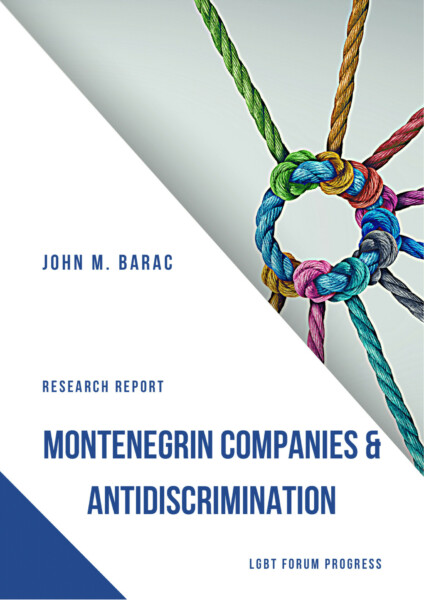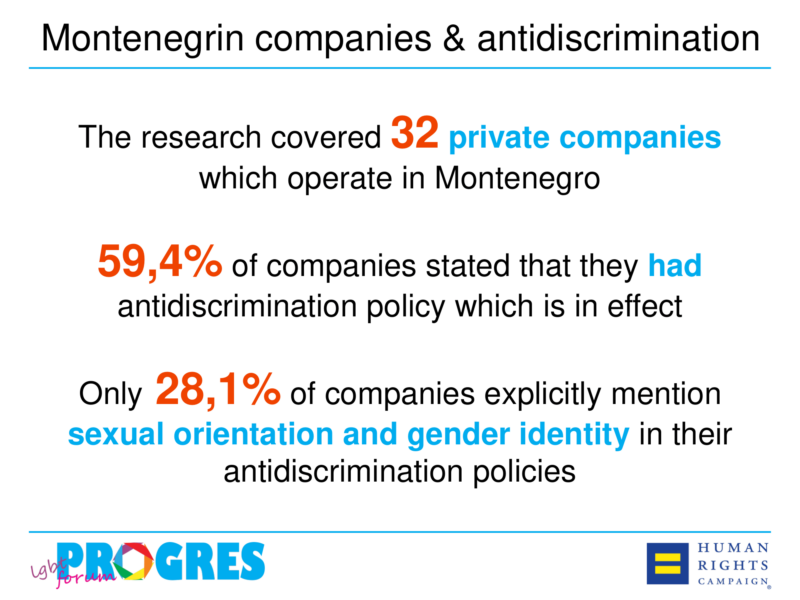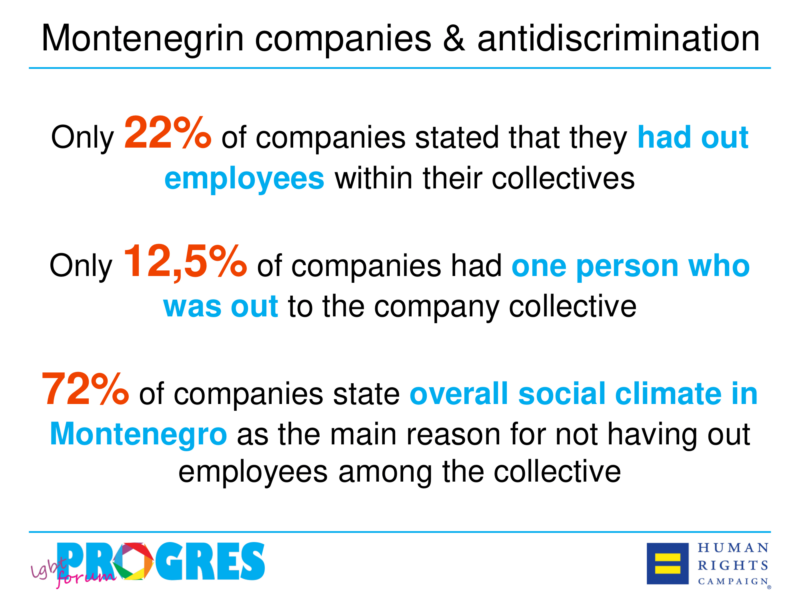 We would like to present the findings of the research about Montenegrin companies and antidiscrimination to the LGBTI community and Montenegrin public. This research report has been created through a pilot project led by John M. Barac, with the support of Human Rights Campaign Foundation. The research covered the January—April 2023 period, while the questionnaire was distributed between March 17 and 31, 2023.
We would like to present the findings of the research about Montenegrin companies and antidiscrimination to the LGBTI community and Montenegrin public. This research report has been created through a pilot project led by John M. Barac, with the support of Human Rights Campaign Foundation. The research covered the January—April 2023 period, while the questionnaire was distributed between March 17 and 31, 2023.
The aim of the research was to explore (and map) antidiscrimination policy in the context of people who belong to minority sexual orientations and/or gender identities and measure the overall climate (environment) which exists in the workplace culture and relation to this vulnerable social group, among leading private companies in Montenegro.
In Montenegro, there is not even representative data that would indicate a clear attitude of private companies as the strongest part of the economy towards persons of less represented sexual orientations and/or gender identities. Therefore, the main task of the research was to collect data and point out the key trends in this regard. An anonymous questionnaire was created, following the research methodology of the Human Rights Campaign in the United States.
The report states that in Montenegro, in the context of the business sector, there are no data related to sexual orientation and/or gender identity. There is no adequate and necessary data for the LGBTI community and LGBTI persons. The lack of data means that it is practically impossible to know where and to what extent discrimination is present, and what is the attitude of companies towards this group which experiences multiple levels of marginalisation.
Furthermore, although this is only a modest beginning, the report suggests that for the first time in Montenegro we are seeing some of the missing data. The indicators that are foreseen require much more attention, resources, and further research in order to precisely locate the real problems, determine their scope, and formulate an adequate antidiscrimination policy in response to the problems. Despite all the limitations, this study pushes the boundaries and opens space for civil society and decision-makers to spot weaknesses in current programmes and policies and to continue advocacy and work to achieve real results in this area.
The companies included in the research were selected based on their total annual revenue at the end of 2021. The focus was on companies with the highest realised revenues, regardless of the sector, i.e., economic branch in which they operate. Also, considering the overall situation regarding the difficulties with the inclusiveness of LGBTI persons in society, as well as the fact that data is being collected for the first time in the subject matter, the research was conceived as anonymous.
Key results
The research “Montenegrin companies and antidiscrimination” covered 32 private companies that are registered and operating in Montenegro. Of this number, a total of 75% stated that they achieved at least five million euros in revenue in 2021, which was taken as a reference year for research purposes.
Of the total number of companies, 59.4% stated that they have an antidiscrimination policy in place, but only 28.1% of companies stated that their antidiscrimination policy explicitly mentions sexual orientation and gender identity.
Additionally, when we look at companies that have an antidiscrimination policy, 78.9% of them agreed with the statement that their employees are aware of the existence of an antidiscrimination policy, while in only 15.8% of cases the anti-discrimination policy was clearly displayed on the company’s website.
Most of those companies that do not have an antidiscrimination policy in place, that is, 69% of them stated that they had never thought about it as the main reason for not having an antidiscrimination policy.
Only 22% of companies stated that they have out employees among their collectives, and in relation to the total sample, only 12.5% of companies have one person who is out among the company’s collective.
In relation to those companies that have out employees, 86% of them believe that the human factor is the main reason why employees feel free to come out. However, as many as 72% of those companies that do not have out employees cited the overall social climate as the main reason for this, while an additional 60% also highlighted the human factor.
Slightly less than a third of all companies, 31% of them, are interested in trainings for the development of comprehensive and inclusive antidiscrimination policies, and 19% of them would be ready to accept digital resources for capacity development in the field of sexual orientation and gender identity. Unfortunately, more than half of the companies (56%) are not interested in any kind of capacity development.
When we look at the acceptance of LGBTI people by management and employees, most companies take a neutral-affirmative attitude towards this topic, and it is similar with the perception of LGBTI people—these topics are mostly not talked about and are not considered.
Finally, only 9% of companies stated that they have publicly supported some of the activities of the LGBTI community so far, while as many as 66% of them stated that they would be ready to do so in the future.
This programme has been conducted with a Global Small Grant from the Human Rights Campaign Foundation.


